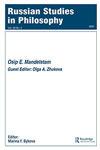弗拉基米尔·S·比伯:一位杰出的俄罗斯哲学家
IF 0.1
4区 哲学
Q4 Arts and Humanities
引用次数: 0
摘要
摘要本文论述了俄罗斯著名哲学家弗拉基米尔·索罗莫诺维奇-比布勒提出的一个新的逻辑概念。通过分析先前的思维方法和逻辑类型,他得出结论,它们是历史决定的,现代欧洲逻辑以科学为导向(17至20世纪处于文化中心),代表了一种科学学说。这种现代逻辑在黑格尔的逻辑中达到了最高的形式,他出色地呈现了认知心灵的整个路径,但也认为它是理解的唯一形式。黑格尔的巨大影响体现在对以往所有逻辑的处理上,从古代到中世纪,都被视为黑格尔逻辑的准备阶段。然而,Bibler看到了黑格尔逻辑方法的局限性,因为它的起点并不在逻辑本身中是合理的,而是在没有反思的情况下被接受,就像现代欧洲科学的创始人牛顿放弃了对力学、力的起点的考虑,只分析它的外表一样。因此,黑格尔的逻辑似乎是绝对完整的,不需要进一步发展。Bibler认为,每一种逻辑都必须从逻辑上证明其起点:现代科学最终陷入悖论,尤其是在证明集合论的逻辑上。Bibler认为存在是以另一种逻辑的形式进入逻辑的。Bibler将发现文化对话性的Mikhail Bakhtin的发现纳入他自己的逻辑概念中,他认为他的新逻辑应该是媒介逻辑,对话的逻辑,而不是像黑格尔那样的单一逻辑。它需要关注的不是科学,而是文化;因此,它可以被称为一种文化逻辑,它将考察理解而不是认知。本文章由计算机程序翻译,如有差异,请以英文原文为准。
Vladimir S. Bibler: A Remarkable Russian Philosopher
ABSTRACT This article discusses a new conception of logic developed by the well-known Russian philosopher Vladimir Solomonovich Bibler. Analyzing prior methods of thinking and previous types of logics, he came to the conclusion that they were historically determined and that modern European logic was oriented toward science (which was at the center of culture in the seventeenth to the twentieth centuries) and represented a doctrine of science. This modern logic reached its supreme form in the logic of Hegel, who brilliantly presented the entire path of the cognizing mind but also considered it the sole form of comprehension. Hegel’s enormous influence found its manifestation in the treatment of all previous logics, from ancient to the medieval, viewed as preparatory stages of Hegelian logic. However, Bibler saw the limitations of Hegel’s approach to logic in the very fact that its starting point was not justified in the logic itself but accepted without reflection, just as Newton, the founder of modern European science, had abandoned consideration of the starting point of mechanics, force, analyzing only its appearances. As a result, Hegel’s logic seemed absolutely complete, requiring no further development. Bibler believes that each logic must justify its starting point extra-logically: Modern science ends up in a paradox, particularly in the logic of justifying set theory. Bibler thinks that being enters into logic in the form of another logic. Bringing the findings of Mikhail Bakhtin, who discovered the dialogical character of culture, into his own conception of logic, Bibler argues that his new logic should be dia-logic, the logic of a dialogue, rather than a mono-logic like Hegel’s. It needs to focus not on science but on culture; it could therefore be called a logic of culture and will examine understanding rather than cognition.
求助全文
通过发布文献求助,成功后即可免费获取论文全文。
去求助
来源期刊

RUSSIAN STUDIES IN PHILOSOPHY
PHILOSOPHY-
CiteScore
0.10
自引率
0.00%
发文量
14
期刊介绍:
Russian Studies in Philosophy publishes thematic issues featuring selected scholarly papers from conferences and joint research projects as well as from the leading Russian-language journals in philosophy. Thematic coverage ranges over significant theoretical topics as well as topics in the history of philosophy, both European and Russian, including issues focused on institutions, schools, and figures such as Bakhtin, Fedorov, Leontev, Losev, Rozanov, Solovev, and Zinovev.
 求助内容:
求助内容: 应助结果提醒方式:
应助结果提醒方式:


